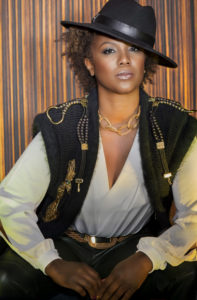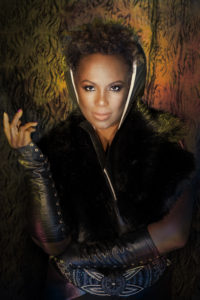
With an understated, steadfast charisma, a voice that demands attention and a message as urgent as it is cogent to the world we’re living in, Toronto-based singer/songwriter Dione Taylor recently released a new single, How Many Times – an exceptional work of musical composition that is as insistent as it is memorable.
Released digitally through Matay Records, How Many Times is as fierce as it is plaintive. It is a song of frustration, but also of strength of character. It is more than a song of protest, it is a cry out to the rest of humanity to stand up to those who say change is impossible, or that compromise is necessary, and especially to those who harbour the sort of ignorance, hatred, misogyny and prejudice that lies behind so many of today’s social and political ills. It is also the first single from her forthcoming album, Spirits In The Water, set to come out late in the year.
“How Many Times was written in response to my frustrations out of what’s been happening in the world, specifically now in 2020 with things like the #BlackLivesMatter and #MeToo movements. It’s not a new subject, so when we were thinking about what the first single should be, we all said immediately that How Many Times was the perfect song to put out right now, because it really resonates with a lot of people, and because the things we’re talking about are not new subjects, unfortunately. Even though I wrote the song almost three years ago, it’s still very, very relevant and extremely important right now,” said Taylor.
“It came about from a combination of watching what was happening with #BlackLivesMatter, what was happening more specifically with the gay and trans people that have been fighting for equal rights, and women’s struggles with ongoing sexism, as well as people who are sometimes not really thought of as being in the spotlight. It came from me watching a lot of my friends struggle to try to fit in. I had a conversation with one of my friends one day and he said, ‘how many times do we have to pray until we get what we want.’ Those were his exact words. And I thought, ‘oh, that’s a really, heavy, heavy line and a very important question.’ And I just ran with it. I thought it was a great question that more and more of us are asking. As someone who grew up in the church, we were taught that if you pray for something and your heart is pure, that you’re going to get that answer. So, it feels very strange to me that a lot of people have been praying for these very noble things and their prayers aren’t answered. That conversation was really the impetus to the tone of the song. And, again, How Many Times is as extremely relevant today as it was three years ago.
“So, yes, it’s an angry cry, but it’s also a desperate cry and it’s a cry that’s coming from deep down within the soul, which is pleading, what more, how much more, and what more do we have to say to be heard and really be feeling like we’re being heard, and that people are saying, ‘I empathize with everything that’s gone on in your life and things that have been happening in the world, so let’s work together and make change and make some actual waves in what is equal and what is right for each and every human being on this earth, to be there very best.’”
The global Covid-19 pandemic has added another layer of anxiety and frustration to the equation as the same sort of deliberate ignorance and cognitive dissonance is affecting how people are responding to logical, medically-proven prevention measures, including social distancing, thorough hand washing, and especially the wearing of masks and other PPE (personal protective equipment.)
 “To a certain extent I blame society because we’re kind of taught to really be self sufficient and I think we’ve taken it to the extreme where a lot of us are not even thinking about how this virus is affecting other people, we’re only thinking about how it inconveniences our self. A lot of people are like, ‘well, I am healthy, I should be able to do what I want.’ Okay, but there are lots of other people who may not be as healthy as you who are at risk and thinking about them is just as important as thinking about yourself. And that sort of thinking runs across a lot of these issues where nobody wants to put themselves in the other person’s situation or be empathetic.
“To a certain extent I blame society because we’re kind of taught to really be self sufficient and I think we’ve taken it to the extreme where a lot of us are not even thinking about how this virus is affecting other people, we’re only thinking about how it inconveniences our self. A lot of people are like, ‘well, I am healthy, I should be able to do what I want.’ Okay, but there are lots of other people who may not be as healthy as you who are at risk and thinking about them is just as important as thinking about yourself. And that sort of thinking runs across a lot of these issues where nobody wants to put themselves in the other person’s situation or be empathetic.
“It’s not just about wearing masks, it’s about getting vaccines, it’s about listening to people’s stories, it’s all these different things that are wound together under this umbrella of inequality. I hope that some good can come out of this pandemic and that people feel moved and really, really, really understand that changes are necessary for all of us to benefit. What we considered normal doesn’t exist anymore. It wasn’t working, so, yeah, we have to figure out what the new way of life is going to be and it has to be an alternate way of life because we need figure out what works for everybody, or at least for most people, not just for the one per cent at the top.”
The first and last verses of the song use the personal pronoun ‘I’, whereas the intervening three use the pronoun ‘we’. This is the approach Taylor believes is necessary to provoke the kind of change that she is elucidating upon.
“I think ‘we’ is whoever resonates with the lyric of the song. ‘We’ is black people, ‘we’ are all females, ‘we’ are children, we can be whoever wants to see themselves in that position and whoever resonates with the words ‘how hard do we have to pray until we get what we want.’ How extraordinary do we have to be for people to see our light and to recognize that we deserve equality too,” she explained.
Joel Schwartz has been Taylor’s creative confrere since not long after she moved to Toronto from her home in Saskatchewan five years ago. She says the pair have developed a remarkable working rapport that continues to bear astounding musical fruit, including How Many Times and the other songs coming on Spirits in the Water.
“Joel and I have been writing together and working together for about four years now, and what I really love about him is his ability to bring out my vision and the music that I have inside of me, and to translate it to the instrumentation that he is so well versed in, which is the guitar, the banjo, the mandolin – all of those sounds that are reminiscent of my past. He is able to take those sounds and bring them to a very modern place,” she said.
“I do play the piano and have sort of certain ideas, but being able to work with a producer in building something together and create something fresh and create a sound that is unique to what I am doing right now and unique to my own voice has been amazing. That’s what was really important and great about working with Joel. And also, we just love to have fun together and would often go grab a coffee and just talk about life. That’s the most important part of working with a producer, having someone who understands and who can help you translate the music that you have inside of your head.”
Schwartz has helped Taylor create a form of music that she calls prairie blues, bringing together the many influences that she encountered growing up in a religious household on the Canadian prairies, later gaining exposure to secular music while in high school.
 “A lot of the music I’ve written, like the prairie blues sound that I came up with, is a blend of the gospel music that I heard in church, folk music, the kind of country that has that southern gospel sound, which was played a lot in my house. It’s a combination of a lot of those different, rootsy styles, but with gospel lyrics. When I started writing my previous album, Born Free. I wanted to create a sound and style of music that was representative of the music that I listened to when I was growing up. I didn’t get exposed to jazz music and blues until high school, and that was through my music teachers. Outside of that I wasn’t allowed to listen to secular music at all. If I went over to a friend’s place, they would have the radio playing or they would have their records and CDs playing here and there. But mostly my sound and my love for music developed through the music I heard at home and at church.
“A lot of the music I’ve written, like the prairie blues sound that I came up with, is a blend of the gospel music that I heard in church, folk music, the kind of country that has that southern gospel sound, which was played a lot in my house. It’s a combination of a lot of those different, rootsy styles, but with gospel lyrics. When I started writing my previous album, Born Free. I wanted to create a sound and style of music that was representative of the music that I listened to when I was growing up. I didn’t get exposed to jazz music and blues until high school, and that was through my music teachers. Outside of that I wasn’t allowed to listen to secular music at all. If I went over to a friend’s place, they would have the radio playing or they would have their records and CDs playing here and there. But mostly my sound and my love for music developed through the music I heard at home and at church.
“It took a while for my parents to come around. We grew apart for a while, but now we’re growing close together and we understand and respect each other. They understand and respect my decision to write the type of music that I want to write, that is important to me. Just because it isn’t ‘quote unquote ‘Gospel’ music, or their type of gospel, it’s my type of gospel because the word gospel means the truth and it’s the truth according to my experience.”
With an insight and focused vision on what she wants to do with her music, it should be little surprise that her forthcoming album Spirits in the Water has a deep, comprehensive and inspired overarching concept.
“It’s been about three and a half years since we started working on it and thankfully, we just finished mastering it in January. All of the songs are done, and the mixing and mastering is done, and everything is ready to go. For this album, I had been thinking about the idea of water and our connection to water and the idea was kind of floating around in my head while I was touring my last album, Born Free,” Taylor said.
“I knew that I wanted to do a concept album and talk about everything that has to do with water and thinking about just the songs that come from that water. I don’t know about you, but I feel a lot of peace when I am beside the water and I try and listen to and feel the vibrations that come from the water. So, I knew that I wanted to write an album about the stories that come from water. There’s happy stories, there’s sad stories, there’s stories of love and death, and all the fun things that have to do with being human.”
For more information on Taylor, How Many Times and Spirits In The Water, visit www.dionetayloe.com, or her social media outlets.
- Jim Barber is a veteran award-winning journalist and author based in Napanee, ON, who has been writing about music and musicians for nearly 30 years. Besides his journalistic endeavours, he now works as a communications and marketing specialist. Contact him at jimbarberwritingservices@gmail.com.
SHARE THIS POST:
